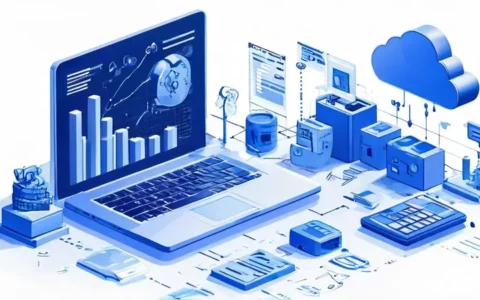
In today's world, virtually every company has the potential to become a coding company. The reason for this is simple: software has infiltrated every aspect of business operations. One prime example is a retail company that develops its e-commerce platform to better serve customers online. By using advanced algorithms for recommendations and inventory management, the company can tailor its offerings to consumer needs with unprecedented precision and efficiency.
I. INTRODUCTION TO CODING IN BUSINESSES
The digital transformation has made coding skills invaluable to businesses. Retail giants, for instance, rely on custom-developed systems to manage vast amounts of data and facilitate online transactions. This digital infrastructure is critical in providing a seamless customer experience, from browsing products to finalizing purchases.
II. INDUSTRIES WHERE CODING IS PIVOTAL
Tech startups are the quintessential coding companies. Silicon Valley is bustling with firms where coding is the essence of their existence. From developing innovative mobile apps to creating disruptive software solutions, coding is the bread and butter of these companies. Additionally, financial corporations often develop their trading platforms, using coding to execute transactions in nanoseconds.
Manufacturing has also been revolutionized by coding. From predictive maintenance systems that forecast machine breakdowns to the use of robotics in production lines, coding enables efficiency and precision in manufacturing processes. Automobile manufacturers, too, are embracing coding to develop autonomous driving technologies and infotainment systems.
In the healthcare sector, coding helps in managing patient records and predicting healthcare outcomes through data analysis. Biotech firms use coding to model biological systems and help in the development of new drugs.
III. CODING IN SMALL BUSINESSES AND STARTUPS
Startups especially leverage coding to bring innovative ideas to market. Mobile and web application development are common areas where startups focus their coding efforts. These applications drive customer engagement and create new revenue streams.
Small businesses are also using coding to develop niche products and services. By creating bespoke software, these companies can serve specialized markets effectively.
IV. THE ROLE OF CODING IN MARKETING AND CUSTOMER SERVICE
Marketing departments use coding to analyze consumer behavior and personalize marketing campaigns. Custom CRM systems and analytics tools created through coding can offer insights that off-the-shelf software cannot.
In customer service, coding is used to create chatbots and self-service portals. These tools enable 24/7 customer support, significantly improving the customer experience.
V. IMPACT OF CODING ON PRODUCT DEVELOPMENT AND INNOVATION
Product innovation is directly linked with coding capabilities. The ability to develop and iterate software products quickly gives companies a competitive edge. For instance, IoT devices require sophisticated coding to function and interact with other devices.
VI. CODING IN CORPORATE OPERATIONS AND LOGISTICS
Efficiency in operations and logistics is greatly enhanced by coding. Supply chain management systems that are developed in-house can provide companies with real-time tracking and inventory management.
Large corporations with complex operations often have bespoke software developed to cater to unique company needs. This can range from internal communication tools to custom HR platforms.
VII. CODING IN STRATEGIC DECISION-MAKING AND BUSINESS ANALYTICS
Strategic decisions are increasingly driven by data. Coding allows the development of business intelligence tools that can analyze market trends and internal data to inform critical business decisions.
VIII. CONCLUSION ON THE UNIVERSALITY OF CODING IN BUSINESS
The presence of coding in a company's structure is no longer a rarity but a necessity for growth and survival. Whether it's a retail behemoth, a biotech startup, or a local niche business, coding empowers companies to innovate, streamline their operations, and offer better products and services to their customers. As companies continue to evolve in this digital age, those that embrace coding are better positioned to lead in their respective industries.
相关问答FAQs:
Q: 什么公司可以编程?
A: 许多不同类型的公司都需要编程技能来支持其业务。下面是几个示例:
-
科技公司:科技公司通常会雇佣大量的程序员和软件工程师来开发和维护他们的产品和服务。例如,谷歌、微软和苹果等大型科技公司都有大规模的软件开发团队。
-
制造业公司:许多制造业公司正在采用物联网和自动化技术来提高效率和生产质量。这些公司通常需要有编程技能的员工来开发和维护他们的设备和生产线上的软件。
-
金融机构:银行、保险公司和其他金融机构通常都需要有编程能力的员工来开发和维护他们的软件系统。这些系统可以用于交易处理、客户服务和风险管理等方面。
-
媒体和娱乐公司:数字媒体和娱乐行业发展迅速,因此公司需要拥有编程技能的员工来开发网站、应用程序和游戏等数字产品。
Q: 编程有什么用途?
A: 编程在现代社会中有许多用途,以下是一些主要的:
-
软件开发:编程是开发和维护各种软件应用程序的关键技能。无论是在计算机、手机、平板电脑,还是在各种嵌入式系统中,都需要程序员来编写代码。
-
数据分析:编程技能对于处理和分析大量数据非常重要。许多公司将数据作为基础来做出决策,所以他们需要数据分析师来编写代码来处理和解释这些数据。
-
网络和安全:随着互联网的发展,网络和信息安全问题也越来越重要。编程可以帮助构建安全的网络系统和应用程序,并防止黑客入侵和数据泄露。
-
自动化:编程也可以用于自动化各种任务和流程。例如,制造业公司可以编写代码来控制机器人和自动化设备,以提高生产效率和减少错误。
Q: 学习编程有什么好处?
A: 学习编程有许多好处,无论是个人还是专业发展。以下是一些主要的好处:
-
就业机会:编程技能是目前非常抢手的技能之一。有编程背景的人可以在许多不同的行业找到工作机会,而且薪水通常也较高。
-
创造力:编程允许将想法转化为现实。无论是开发自己的应用程序还是参与开源项目,编程可以让人们以创造性的方式解决问题和实现新的想法。
-
逻辑思维:编程要求逻辑思维和解决问题的能力。通过学习编程,人们可以提高他们的逻辑思维能力,并应用于其他方面,如数学和科学。
-
自主学习:编程是一门永远在变化和进化的领域,所以学习编程也是一个持续的过程。通过编程学习,人们可以培养自主学习和自我成长的能力,以适应快速变化的技术环境。
总的来说,编程是一项有用、富有创造性和有前景的技能,无论是在工作中还是个人发展中,都能够带来许多好处。无论你从事什么行业,在学习编程方面投入时间和精力都是值得的。
文章标题:什么公司可以编程,发布者:不及物动词,转载请注明出处:https://worktile.com/kb/p/1799644

 微信扫一扫
微信扫一扫  支付宝扫一扫
支付宝扫一扫 




